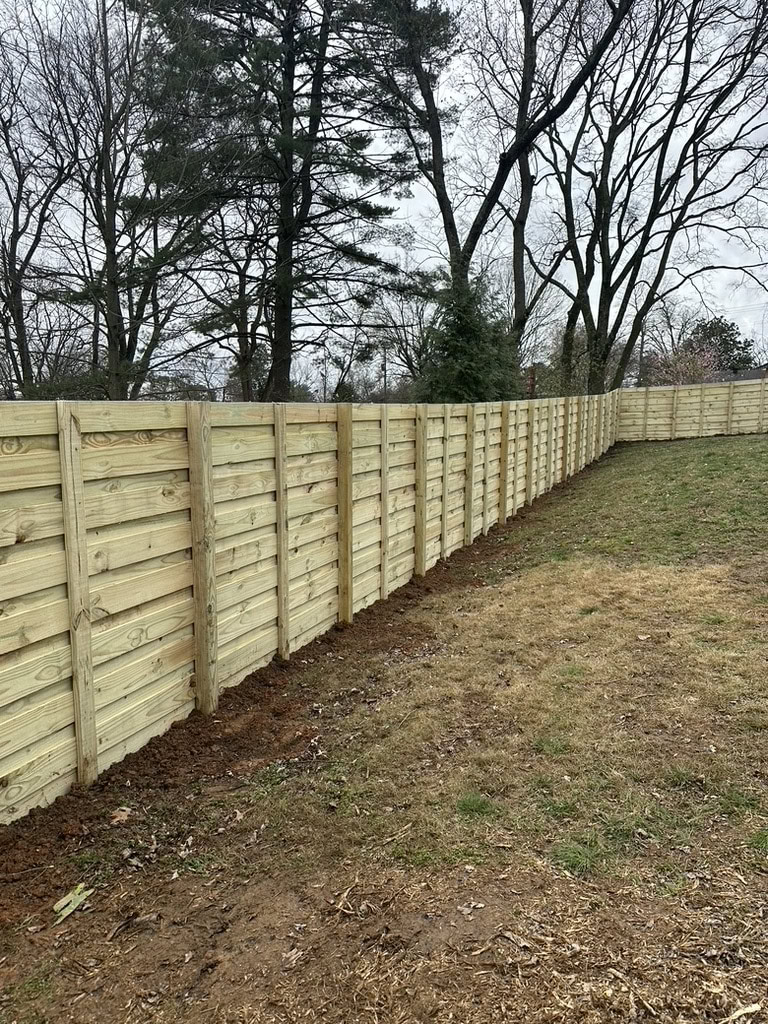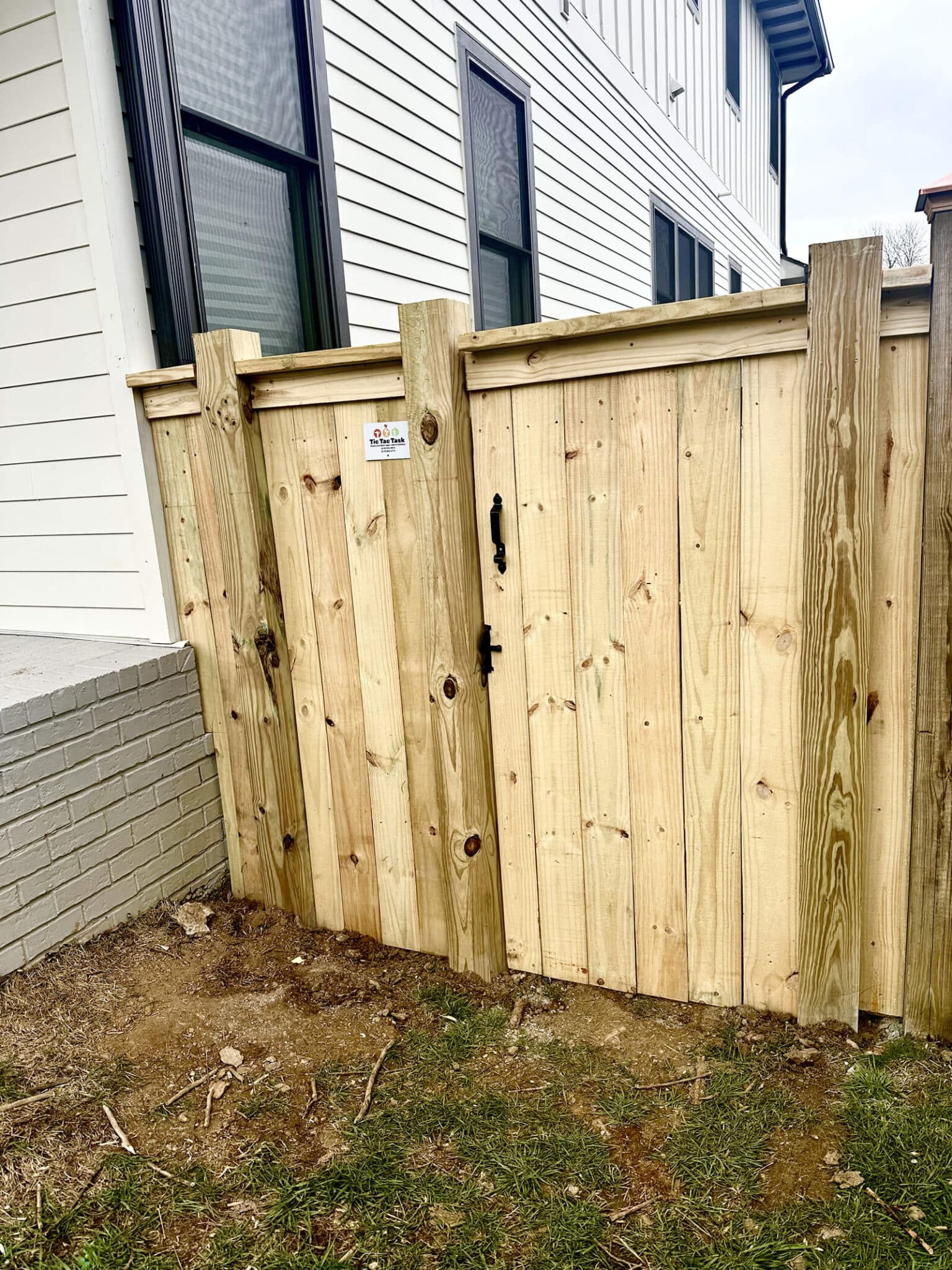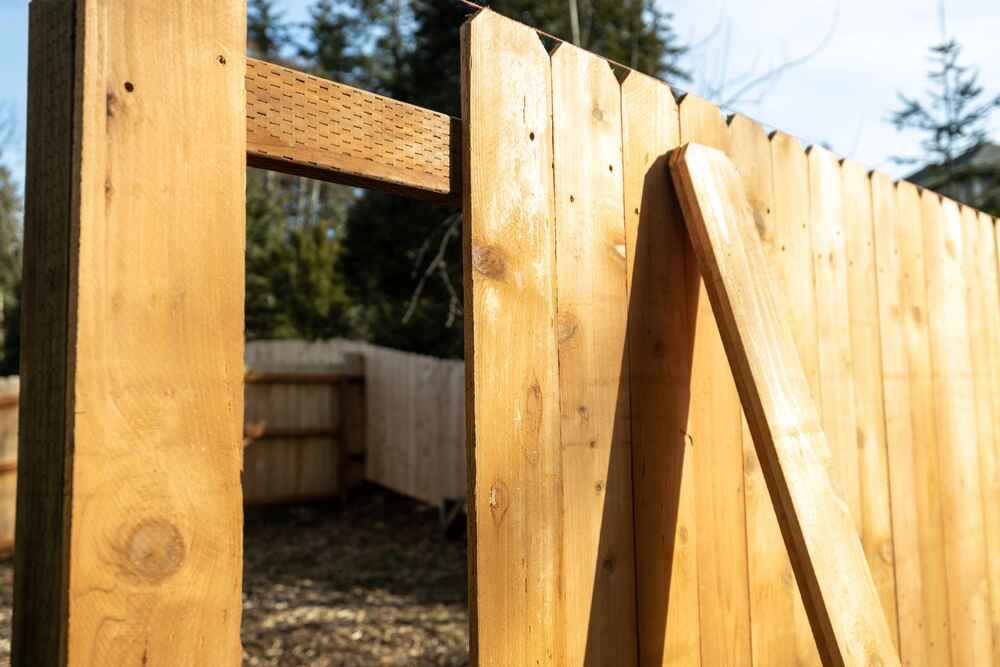Summary:
Why Davidson County's Climate Destroys Unprotected Wood Fences
Davidson County sits in Tennessee’s humid subtropical zone, where your fence faces a perfect storm of destructive conditions. Summer humidity regularly exceeds 70%, causing wood to absorb moisture and swell. When dry periods hit, that same wood contracts rapidly, creating stress fractures and splits.
The UV exposure here is intense. Tennessee gets over 200 sunny days per year, and those rays systematically break down lignin – the natural polymer that keeps wood strong and naturally colored. Without protection, your fence starts that telltale gray weathering within 6-8 months.
Add in our 47 inches of annual rainfall, often coming in heavy downpours that saturate wood quickly, and you’ve got conditions that accelerate deterioration. Wood begins breaking down the moment it’s cut, but Middle Tennessee’s climate pushes that process into overdrive.
The Hidden Damage Happening to Your Fence Right Now
Even if your fence still looks decent, damage is likely already underway. Moisture doesn’t just sit on wood surfaces – it penetrates deep into the grain, where it causes swelling during humid periods and shrinkage during dry spells. This constant expansion and contraction creates internal stress that leads to cracking and warping you won’t see until it’s severe.
Nashville’s weather patterns make this worse. We get sudden temperature swings and intense storms that can saturate wood in minutes. When that moisture freezes during winter months, it expands inside the wood fibers, creating internal damage that compromises structural integrity from the inside out.
UV damage works differently but just as destructively. The sun’s radiation breaks down the wood’s natural oils and protective compounds, making it more porous and vulnerable to moisture penetration. That gray weathering you see isn’t just cosmetic – it’s visible proof that your wood’s defenses have been compromised.
Here’s the real problem: these factors accelerate each other. UV damage makes wood more susceptible to moisture problems. Moisture damage creates cracks that expose more interior wood to UV rays. Once this cycle starts, deterioration happens fast. A fence that could last decades with proper protection might need replacement in 5-7 years without it.
Professional staining breaks this cycle by creating a protective barrier that repels moisture while blocking harmful UV rays. But timing matters – the best protection happens before visible damage appears, not after.
Warning Signs Your Davidson County Fence Needs Immediate Protection
Gray discoloration is your fence’s cry for help. By the time wood looks gray, UV damage has already broken down the surface fibers and natural protective oils. The wood is now more porous and vulnerable to moisture penetration than when it was new.
Black spots or streaks indicate mold and mildew growth – clear evidence that moisture has penetrated the wood and created conditions for biological deterioration. In Davidson County’s humid climate, this can happen within months on fence sections that don’t get direct sunlight to help with drying.
Feel your fence boards with your hand. Rough, splintery texture means the surface fibers are breaking down from UV exposure. Soft spots that give under pressure indicate moisture damage has begun affecting structural integrity. Either condition means your fence is losing its ability to protect itself from further damage.
Cracking and splitting are advanced warning signs. Even small hairline cracks create entry points for moisture that expand during freeze-thaw cycles. In Tennessee’s variable climate, small cracks become big problems quickly. Once splitting starts, it accelerates unless the wood is properly protected.
The key insight: these problems are preventable with professional staining, but they’re expensive to fix once they develop. A fence that needs board replacement or structural repair costs far more than preventive protection would have.
How Professional Fence Staining Actually Protects Your Investment
Professional fence staining isn’t just about making wood look better – it’s about creating a multi-layered defense system against Tennessee’s climate challenges. Quality stains penetrate deep into wood fibers while forming a protective surface barrier that repels water and blocks UV rays.
The products matter enormously. Professional-grade stains contain UV inhibitors that prevent sun damage, water repellents that stop moisture penetration, and conditioning oils that keep wood fibers flexible and strong. These aren’t the same products available at retail stores – they’re formulated specifically for harsh outdoor conditions.
Application technique determines whether protection lasts months or years. Professional application ensures even coverage, proper penetration, and attention to vulnerable areas like end grain and joints where moisture typically enters first.
Why Professional Application Delivers Superior Long-Term Results
Surface preparation makes the difference between stain that protects and stain that fails prematurely. Professional cleaning removes dirt, mildew, and gray weathering that prevent proper stain penetration. This process requires specific cleaning solutions and techniques that open wood grain without damaging the surface – something most homeowners don’t have the equipment or knowledge to do correctly.
Moisture testing ensures optimal staining conditions. Wood must be dry enough for stain to penetrate properly – typically 12-13% moisture content or less. We use moisture meters to verify conditions, while DIY attempts often involve guesswork that leads to poor adhesion and early failure.
Weather timing is critical in Davidson County’s unpredictable climate. We monitor temperature, humidity, and forecast conditions to choose optimal application windows. Staining in wrong conditions causes poor penetration, uneven coverage, or premature coating failure that leaves your fence vulnerable.
Professional spray application, when done correctly, ensures consistent coverage and proper penetration that’s difficult to achieve with brushes and rollers. The right technique avoids common problems like lap marks, drips, and missed spots that create weak points in your fence’s protection.
Product selection requires understanding how different stain types perform in Tennessee’s specific climate conditions. Oil-based stains behave differently than water-based products in high humidity. Semi-transparent stains offer different protection levels than solid stains. We match product characteristics to your fence’s exposure conditions and protection needs.
The result is protection that penetrates deep into wood fibers while maintaining the natural beauty that made you choose wood fencing in the first place.
Creating a Long-Term Protection Strategy That Saves Money
Effective fence protection requires a maintenance strategy, not just one-time treatment. Professional staining typically provides 3-5 years of protection in Davidson County’s climate, but the timeline varies based on fence orientation, sun exposure, and local weather patterns.
Smart maintenance timing prevents expensive repairs. The best time for re-staining is before visible deterioration appears – when the protective coating begins losing effectiveness but before wood damage occurs. This approach costs far less than waiting until boards need replacement.
Tennessee’s mild winters actually create opportunities for strategic staining. Daytime temperatures above 36 degrees provide good staining conditions, and winter application prevents the mold and mildew buildup that develops if you wait until spring. This timing ensures your fence is protected before challenging summer weather arrives.
Quality stains work below the wood surface, creating protection that doesn’t peel or chip like paint systems. When maintenance time comes, properly applied stain can often be refreshed without stripping – just clean and apply a fresh coat. This saves significant time and money compared to paint systems that require extensive prep work for reapplication.
Between professional treatments, monitor your fence for early warning signs. Water should bead on properly protected wood. If water soaks in immediately, the protective coating is wearing thin and needs attention before moisture damage begins.
This proactive approach protects your investment while avoiding the much higher costs of repair or replacement that come from neglecting fence protection in Tennessee’s challenging climate.
Protecting Your Davidson County Fence Investment the Right Way
Your fence represents thousands of dollars invested in privacy, security, and property value. Professional staining protects that investment while maintaining the natural wood beauty that adds character to your property. The cost of proper protection is always less than premature replacement.
Tennessee’s climate will challenge your fence whether you protect it or not. Professional staining gives your wood the best possible defense against humidity, UV damage, and moisture penetration that cause expensive deterioration. The right approach extends your fence’s lifespan while keeping it looking great year after year.
When you’re ready to protect your fence properly, we understand Davidson County’s specific climate challenges and have the experience to deliver lasting results. Professional fence staining is an investment in your property that pays dividends in protection, appearance, and long-term value.




